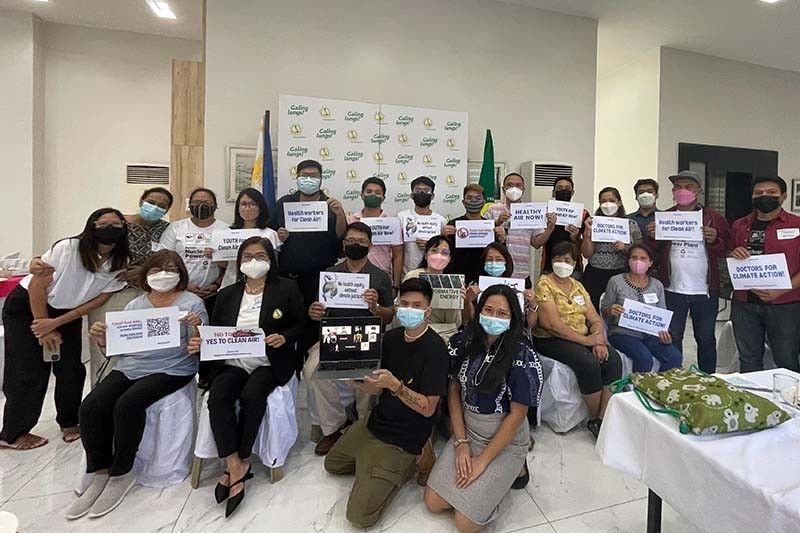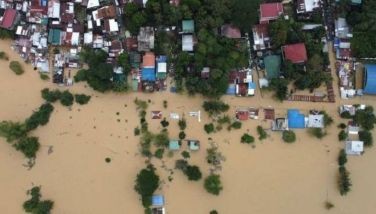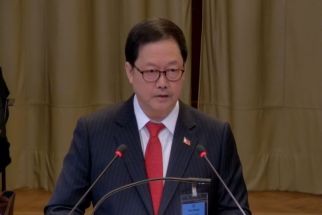'Dirty' energy, outdated air quality standards keep Filipinos at risk from air pollution

MANILA, Philippines — Health professionals and environmental advocates on Wednesday urged the government to combat air pollution that is harming the people and the planet by swiftly transitioning away from fossil fuels and updating the country’s air quality standards.
On the third International Day of Clean Air for Blue Skies, advocates of public health and environment called for a rapid transition from fossil fuel energy sources, and to clean and renewable energy.
The burning of fossil fuels such as coal, oil and gas is not only a major driver of climate change, but it is also a main source of air pollution.
"We need to save lives and we need to save our planet… The urgency of the impacts of climate change is now. We have to act now, including this whole issue of air pollution related to our energy policy," said Ramon San Pascual, executive director of Health Care Without Harm Asia.
Air pollution from burning fossil fuels leads to premature deaths, heart attacks, respiratory disorders, stroke, and asthma.
According to a 2019 study of the Centre for Research on Energy and Clean Air, pollution from coal was responsible for an estimated 640 air pollution-related deaths, 1,300 cases of childhood asthma, 149,000 days of work absence, and 240 preterm births in the Philippines.
A separate study by Greenpeace in 2020 estimated that air pollution-related premature deaths in the country reached 11,000 to 27,000 in 2018 alone.
"Pakiramdam po namin ang aming pakikibaka sa coal ay maihahalintulad namin pagma-martsa sa kamatayan dahil sa araw-araw na nararanasan ng mga komunidad sa Bataan dahil sa pollution," said Derek Cabe, an anti-coal advocate from Bataan.
(We feel that our fight against coal can be likened to marching to death because of the daily experiences of communities in Bataan due to pollution.)
Improve air quality standards
Air pollution from various sources has increased even after the passage of the Clean Air Act of 1999. Health and environment advocates note the country’s clean air standards and policies have fallen behind international best practices.
"It’s on the backburner because we’re always looking at other issues. For example: Boracay, Manila Bay, flooding issues. But the impacts of climate change that manifest in air pollution caused by extractive industries such as fossil fuels are not given attention because there’s a huge industry," San Pascual said.
Advocates called on authorities to strictly implement policies, administrative orders and ordinances that accompany the Clean Air Act, and require Health Impact Assessments and Health Impact Clearance Certificates for all development projects.
They also urged the government to prioritize raising the country’s emission limits to the current standards set by the World Health Organization.
The particulate matter (PM) 2.5 concentration limit set by the Philippines—25 microgram (μg) per cubic meter—is higher than the limit of 5 μg/m3 set by the WHO in 2021. Fine particles, called PM2.5, are considered particularly harmful because they can penetrate deep into the lungs or cardiovascular system.
They added that investing in and strengthening the country’s air quality monitoring systems, and making them accessible to the public are necessary interventions.
Role of health workers
Dr. Imelda Muriel-Mateo, president of the Philippine College of Chest Physicians, urged her fellow healthcare professionals to advocate for clean air.
"When doctors, nurses, hospitals, and health systems take public stances on air pollution and climate change, it can reframe these issues as questions of public health and help move public opinion and policy," Mateo said.
"The voices of health workers are critical in promoting actions that address air pollution and its impacts on health," she added.
- Latest

























